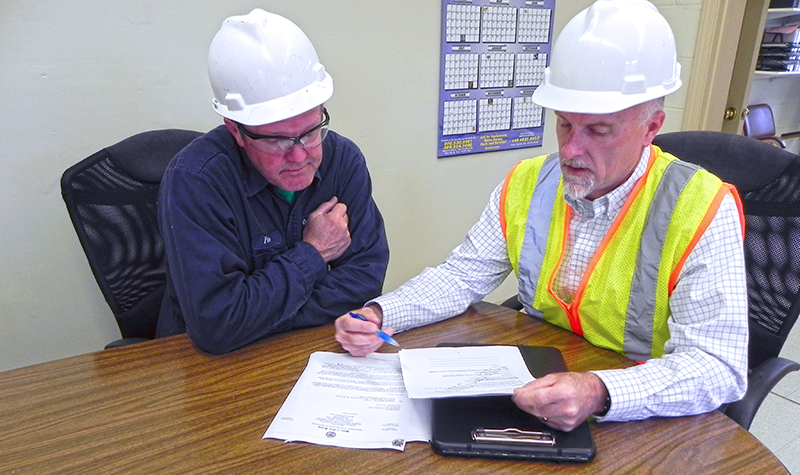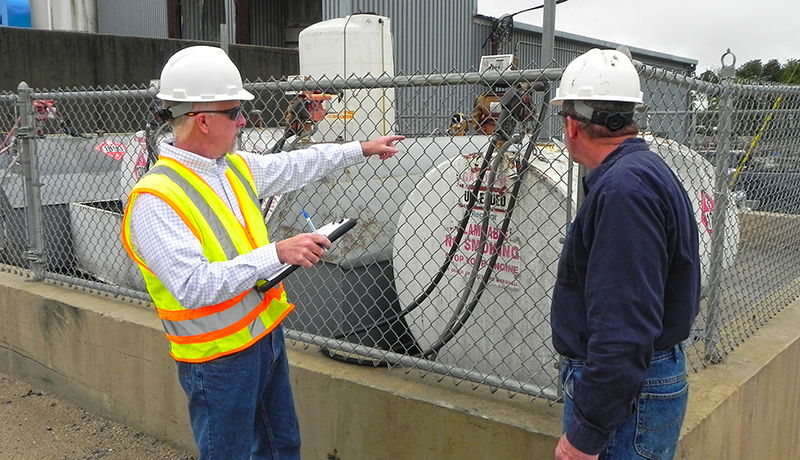Your guide to handling a successful environmental inspection every time.
City environmental agencies, county agencies, state agencies, federal agencies, 3rd party environmental groups....the list goes on and on. You can count on being inspected by any of these groups at almost any time, and here's how you can make it a walk in the park.
If you're a site manager, plant manager, area manager, environmental manager, etc., you've most likely experienced an inspection by some sort of regulator at some point. And, if you've experienced an inspection, you've likely worried about getting in trouble.
In fact, we hear things like this from folks on a regular basis:
The guy showed up without saying a word! He walked right in like he owned the place! He demanded to see documentation, walked around the site, and he hit me with a massive violation after he left!
Sound familiar? Let's hope you've never gotten a massive violation, but we've certainly heard similar stories like this numerous times before.
I’ll admit, the thought of an inspector just showing up randomly might seem a bit stressful and scary. Local and county inspectors usually aren't an issue. They frequently check in on things like local zoning and permitting issues.
State and federal inspectors can carry a lot of authority with them, and can be trouble. But, the worst, and by worst I mean most threatening, are 3rd party groups. An inspection from these people usually is a precursor to bad news, since they're only there because they did some digging and found out you're not following the rules in some way, shape, or form.
(No legal advice here, but be aware that outside parties may not have the authority to enter your property to carrry on an inspection, in fact, they probably don't without some legal standing. So don't just let "anyone" come onto your property.)
If you aren't in environmental compliance, you'll likely be facing a fine, violation, and you'll have to fix your problems, all meaning time and money you probably don't have.
For the sake of this post, we're going to focus on getting an inspection from a state of federal official, and these main ideas should help you handle any inspection in a smooth fashion.

How to easily survive an environmental inspection.
Be prepared at all times.
This isn't really a tip, just more of a heads up.
Inspectors will rarely announce they're going to be paying you a visit. Some legally can't announce they're coming.
Meaning, you have to be ready at all times. That doesn't mean stay open after hours and on the weekends, but if you're open for business, you're fair game for an inspection.
Have your paperwork in order.
Most issues we see with people getting violations have to do with their paperwork being a mess. Things like not documenting inspections or training, failing to print out necessary documents, or having old permits, plans, and paperwork all mixed together.
Keep everything in order. Keep everything neatly labeled. Keep it somewhere that's easy to find, but out of harms way. You want an inspector to be able to flip through whatever they're looking at, find the information they need, and get out of your hair.
Actually do your inspections.
This is two-fold. One, most permits, plans, and approvals require you to conduct inspections, so you have to do them. Make sure you're documenting them!
And secondly, by inspecting your facility on a regular basis, you'll be able to spot things before they become a big problem. You'll also notice if trash is building up in certain areas, or if there's a mess to be cleaned up, or something's leaking, etc.
When an inspector walks around and inspects your facility, you want them to think everything's clean, everything's fine, no problem here.
On a side note, I encourage facilities to do their inspections at the same time. For instance, if you have a stormwater permit and SPCC Plan, you could conduct both inspections at the same time. Or if you have two separate people conduct those inspections, have them inspect the facility together. It's always a great idea to have a second set of eyes on the operation. (I'll touch more on this below.)
Have a written Visitor's Protocol procedure for dealing with any type of visitor.
This is a long one, so bear with me.
If I had a dollar for every time I've shown up to a facility, parked, and started walking around without anyone stopping me, I wouldn't be writing this article right now. I usually end up walking through a maintenance shop, taking a few pictures, and asking a few questions before anyone stops me and wants to know who I am.
You cannot let that happen. Random people cannot be allowed to walk around your facility. At the very least it is a safety issue!
Imagine I was a "spy" for a 3rd party environmental group. I could be taking pictures, recording video or audio, and if you're doing something you shouldn't be, you'd be in a world of trouble. Granted there are some legality issues to deal with here, but do you want to fight this fight in a court, especially if you're in the wrong? No!
And, don't you or anyone on your staff be fooled by someone showing up from the "environmental agency". What's that mean? I have heard stories of people vaguely identifying themselves in the hope that your employees will be intimidated by an "environmental inspector" thinking it's someone official. Don't fall for this. If they're an official visitor, they have a right to enter your site. If not, hit the road!
Develop a written Visitor's Protocol, and actually enforce it.
Educate your staff. If anyone is there and they're not an employee, make sure someone is notified immediately and the visitor is directed to where ever they should "report in" at.
Make sure your staff knows who is the spokesperson for the facility and can take time off of their paid duties to talk with a visitor, and who can't. You don't want your disgruntled employee venting to some visitor, do you?
Make sure it's clear where visitors can and cannot park. Make sure visitors can clearly identify where they need to check in at. Post signs if necessary.
Develop some sort of sign-in and sign-out system. Demand to see identification and take down their information. It's your facility, your operation, your business, so you have the right to record who is coming and going. Take down their name, number, position, and their company or organization. If possible, get their business card (who doesn't have a business card?).
Any real inspector to your facility will have no objection whatsoever about giving you or showing their proper identification. If they balk for any reason, be wary.
And if they don't have a business card (other than giving them the web address for firms who will make business cards dirt cheap, come on and spend $10 for 500 business cards and act like a professional!), then make one up. Give them one of yours, and ask them to write down on it everything that will be on a standard business card. At the very least, you need their name, title, organization, address, office number, cell number and email address.
Ask why they're there and what they're inspecting.
If they're reviewing your documents, then sit and review with them. If they take notes on something, ask questions and take your own notes. Always have a pen and paper handy, or jot down notes in your phone or laptop or whatever you have handy. Include the date and time, and who you're talking to, and what you're going over.
If they're walking the site, go with them. If they say they don't want you there, tough. It's your facility, your property, and your company, so let them know that company policy dictates that every site visitor is to be accompanied at all time, no matter what.
If they're taking notes or pictures or recording video, do the same. Again, keep a record of the inspection. If they're noting something, ask questions.
And on a safety note, make them wear PPE. Again, no if's and's or buts. It's your facility, and the company policy, so they have to wear it regardless.
And when the visit is concluded, ask for a summary. What was found? Any problems or issues? Anything we need to supply after the visit?
And, write everything down. I mean it - everything.
Finally, one note about a Visitor's Protocol. It isn't worth anything unless your staff knows about it. Unless they've maybe even trained on it, practiced on it. Make sure they understand how it works. Otherwise, it won't.
Have a backup plan for when you're not around.
If you're sick, in a meeting, on vacation, whatever, and you're not around and an inspector shows up, have a plan in place to handle it.
Have another staff member brush up on everything they'd need to know about handling an inspection.
Have someone else capable of escorting an inspector around the facility. Better yet, have a whole team! Have a few folks capable of dealing with inspectors. Make sure they know what's what. Make sure they know the procedure for when an inspector shows up.
You need to be prepared all the time, even when you're not around.
Don't be a jerk to your inspector.
Look, inspections are an unfortunate fact of life. Deal with it. The 'nobody likes the taxman' mentality, right?
Don't take it out on your inspector. Don't be a jerk. I cannot stress this enough. Be polite. In fact, try and be friendly.
Yes, they're taking up your time. Yes, it's a random inconvenience. Yes, they could be giving you a fine or penalty. But, they're less likely to do that if you're nice to them.
The nicer you treat them, the nicer they'll (usually) treat you.
You don't have to be their best friend, but don't become their enemy. When they come in, offer them a coffee or water or let them know where the bathroom is.
If you're sitting in a conference room with phone chargers laying around, let them know you've got some extra chargers if they need to juice up their phone for a bit.
Make some small talk. Remember things. If you figure out they like a team, or a sport, or an activity, keep it in the back of your mind. Again, don't become their best friend, but be civil and treat them with some respect and dignity.
Don't be rude and never, ever lie to these folks. If you're doing something wrong they're going to find out. And, lying could get you into some serious hot water, including enforcement against you personally.
If something's wrong, let them know you'll address and rectify the situation. Being a decent person might be the difference of the regulator letting you slide with a warning vs. getting a violation or fine.
Make sure they leave happy.
You have to admit, no matter how much you like your inspector, the second they show up you're counting the seconds down until they leave. Even if you're friendly, you have a business to get back to and can't spend all day palling around.
So, when the regulator does eventually leave, make sure they're leaving on a good note.
If a problem is found, let them know it will be fixed, and you either have a plan to fix it, or will address it soon with others in your organization. If they're unhappy about an element with your plan or permit, let them know you'll work on getting it fixed.
But, don't let them walk all over you. If they want you to do something and you don't think you should or need to, let them know you'll look into it and get some help from somewhere. Contact your regional manager or environmental manager or contact an expert for some help on the subject.
If a big problem arises and they get in a bad mood and leave angry, sometimes there's nothing you can do about it, but let's hope that's not your case.

I've never had an environmental inspector or regulator inspect my facility.
It's rare, but this does happen!
We picked up a new client about 3 months ago who in 30+ years of business had never been inspected.
They slipped through the cracks. They needed a stormwater permit, didn't have one, and the state agency is cutting them some slack since they dropped the ball. But, the company does need a permit, will need to do inspections, and be prepared for regulators to show up.
Don't bank on being this company. Those days are numbered. 3rd party groups actively look for companies like this because in their eyes this organization was willfully neglecting the regulations because they were a big, bad evil corporation who hates the environment and regulations and all that rhetoric.
In this guy's case, he was an older gentleman with a small facility tucked away in a remote part of the state. He never got too large, had a great reputation in his community, never had an issue with safety or fire or staff or anything, and he honestly didn't know he needed a permit.
Once he found out, he did the right thing and got one. He's now 100% up to speed and doing everything he should be doing. There's nothing evil about his intentions, he just wasn't being inspected or educated by the agency that regulates him.
But, like I said, those days are numbered.
There are more 3rd party environmental groups every year. There are more regulations every year. There's larger budgets, more regulators, more facilities that are getting swept into old regulations, or being given new regulations.
You need to have a plan for dealing with regulators. Be prepared.
Alexander Graham Bell said, "before anything else, preparation is the key to success", which rings truer than ever.
To learn more about surviving environmental inspections, and how you can be prepared for the next time your regulator shows up, click here to contact us or give us a call at 609-693-8301.












